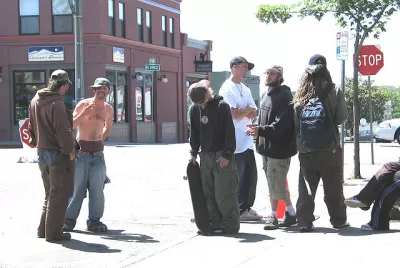The Northern California city of Arcata has long tolerated the production of California's most second-most-lucrative mood-altering crop. Now, the city is considering an official zoning designation to accommodate marijuana production.

They don't call it the "Emerald Triangle" for nothing. Emerald has long referred to the lush forests of California's north coast, and, more recently, to its profusion of black-market marijuana production. Lately, though, green has referred to cash—the roughly $1.4 billion that the commercial marijuana industry, operating on the fringes of legality, has brought to the region. Statewide, the weed industry is estimated to be worth $31 billion annually, compared to $51 billion for wine.
With potentially hundreds of growers, producers, and chefs operating within its city limits, the hippie-friendly city of Arcata has taken steps to become the first city in the country to regulate, and accommodate, not only pot dispensaries (which are legal for consumers of medical marijuana in California) but also production facilities. The logic, say some city officials, is clear: give producers a proper, safe place to operate, and they won't invade neighborhoods or, worse, create dangerous, unsanitary products.
Arcata's city council has taken preliminary steps to create a "Medical Marijuana Innovation Zone," which could be implemented by the end of the year. It could potentially accommodate indoor growers and producers of edibles, among others. This move hearkens back to the origins of zoning, by which cities segregated noxious uses from everyday folks. If the industry continues to grow, the zoning could serve as a model for other cities in pot-friendly states and give Arcata a leg up if Californians vote to legalize recreational marijuana, as it might next year via a ballot measure.
"City officials say the power of zoning offers its best, and perhaps only, tool for regulating the marijuana industry, which otherwise depends on decisions at the state level. Arcata-based attorney Mark Harris, advisor to the National Organization for Reform of Marijuana Laws (NORML) says he considers the zone an 'overwhelmingly positive' development. He sees this approach as a model not only for cities throughout California but also for those in other pot-friendly states."
"It’s refreshing to see local authorities recognizing that their communities will benefit economically by welcoming the transition of this already lucrative cash crop from criminal hands to tax-paying, job-creating, law-abiding businesses," says "Radical" Russ Belville, a Portland, Oregon-based radio host and marijuana activist.
FULL STORY: California City Moves Toward Innovation Zone for Marijuana

Planetizen Federal Action Tracker
A weekly monitor of how Trump’s orders and actions are impacting planners and planning in America.

San Francisco's School District Spent $105M To Build Affordable Housing for Teachers — And That's Just the Beginning
SFUSD joins a growing list of school districts using their land holdings to address housing affordability challenges faced by their own employees.

The Tiny, Adorable $7,000 Car Turning Japan Onto EVs
The single seat Mibot charges from a regular plug as quickly as an iPad, and is about half the price of an average EV.

Seattle's Plan for Adopting Driverless Cars
Equity, safety, accessibility and affordability are front of mind as the city prepares for robotaxis and other autonomous vehicles.

As Trump Phases Out FEMA, Is It Time to Flee the Floodplains?
With less federal funding available for disaster relief efforts, the need to relocate at-risk communities is more urgent than ever.

With Protected Lanes, 460% More People Commute by Bike
For those needing more ammo, more data proving what we already knew is here.
Urban Design for Planners 1: Software Tools
This six-course series explores essential urban design concepts using open source software and equips planners with the tools they need to participate fully in the urban design process.
Planning for Universal Design
Learn the tools for implementing Universal Design in planning regulations.
Smith Gee Studio
City of Charlotte
City of Camden Redevelopment Agency
City of Astoria
Transportation Research & Education Center (TREC) at Portland State University
US High Speed Rail Association
City of Camden Redevelopment Agency
Municipality of Princeton (NJ)




























